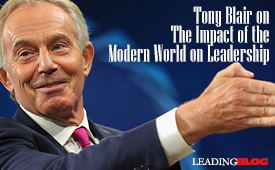5 Leadership Lessons: Tony Blair on Leadership Essentials
TONY BLAIR wrote a book about leadership in government. However, his practical ideas on leading in the 21st century apply across the board. Leadership, both good and bad, leaves clues for us to study how other leaders have handled problems and challenges common in all leadership situations. On Leadership does just that.
It is the unwise leader who thinks they know everything. Learning from others’ mistakes and successes is the best way to guard against leadership hubris. Below are a selection of Blair’s thoughts on leadership.
![]() Leaders have the courage not to go with the flow. They speak up when others stay silent. They act when others hesitate. They take the risk, not because they fail to identify it as risk but because they believe a higher purpose means the risk should be taken. The Leader sets out for the people what they need and not simply what they want. Otherwise, the Leader is just a follower.
Leaders have the courage not to go with the flow. They speak up when others stay silent. They act when others hesitate. They take the risk, not because they fail to identify it as risk but because they believe a higher purpose means the risk should be taken. The Leader sets out for the people what they need and not simply what they want. Otherwise, the Leader is just a follower.
![]() If You come across something unpleasant or cruel that has been written about you: DON’T READ IT! If it’s a horrible headline, ignore it. If it’s an awful article, don’t look at it. None of this means that you shouldn’t listen to sensible and serious criticism. You should. You can learn from it. But you won’t learn anything from the stuff that’s vomiting forth, that’s written for clicks, that delights in its nastiness, that takes pleasure in the hope it is inflicting pain. And if you let it get to you, then you have lost, and ‘they’—whoever at any given time ‘they’ may be—have won. Treat the handling of criticism not as about the receiving of a blow, but as the willingness to be knocked down by it. See refusal and defiance as victories. Because they are.
If You come across something unpleasant or cruel that has been written about you: DON’T READ IT! If it’s a horrible headline, ignore it. If it’s an awful article, don’t look at it. None of this means that you shouldn’t listen to sensible and serious criticism. You should. You can learn from it. But you won’t learn anything from the stuff that’s vomiting forth, that’s written for clicks, that delights in its nastiness, that takes pleasure in the hope it is inflicting pain. And if you let it get to you, then you have lost, and ‘they’—whoever at any given time ‘they’ may be—have won. Treat the handling of criticism not as about the receiving of a blow, but as the willingness to be knocked down by it. See refusal and defiance as victories. Because they are.
![]() When things are going really well, that’s the time to worry about what could go really wrong. Hubris, in its most egregious form, combines overbearing arrogance with malevolence. But hubris can also stem as much from ignorance as vice. The sin lies in these characteristics: thinking you know more than you do; a belief that you have the power to affect a situation that you can’t, or at least not in the way you want; an overly exuberant conviction that you can overcome the odds, however much they may be against you; a faith that by sheer force of conviction you can triumph over an embedded reality.
When things are going really well, that’s the time to worry about what could go really wrong. Hubris, in its most egregious form, combines overbearing arrogance with malevolence. But hubris can also stem as much from ignorance as vice. The sin lies in these characteristics: thinking you know more than you do; a belief that you have the power to affect a situation that you can’t, or at least not in the way you want; an overly exuberant conviction that you can overcome the odds, however much they may be against you; a faith that by sheer force of conviction you can triumph over an embedded reality.
![]() Since leaving office, I have met a big swathe of the business community, including, for fundraising purposes, a significant number of billionaires. I have noticed, however, that in some that success has given them a sense of self-belief that makes them think they’re not only good at the thing that made them rich, but smarter than anyone on other things. The political world contains similar offenders. You win great victory or manage to ascend somehow to the top of what the nineteenth-century Conservative prime minister Benjamin Disraeli called “the greasy pole.” You conclude that you’re a genius. You figured it all out. You came through. You beat the rest. You forget that it isn’t only about ability; it is also about circumstance, the door of opportunity opening in a timely manner, the poor quality of the opposition and, of course, luck.
Since leaving office, I have met a big swathe of the business community, including, for fundraising purposes, a significant number of billionaires. I have noticed, however, that in some that success has given them a sense of self-belief that makes them think they’re not only good at the thing that made them rich, but smarter than anyone on other things. The political world contains similar offenders. You win great victory or manage to ascend somehow to the top of what the nineteenth-century Conservative prime minister Benjamin Disraeli called “the greasy pole.” You conclude that you’re a genius. You figured it all out. You came through. You beat the rest. You forget that it isn’t only about ability; it is also about circumstance, the door of opportunity opening in a timely manner, the poor quality of the opposition and, of course, luck.
![]() A Leader should never bear a grudge. Grudges are wasted energy. They are pointless and mentally time-consuming. They are bad for the esteem in which others hold you and in which you hold yourself. They’re also a sure way of converting someone who dislikes you into someone who hates you. Leadership is best exercised when the senses are cold, not hot; calm, not stormy; detached from personal rancor; when the teeth are not grinding or gnashing and the eyes are seeing the whole picture, not the small corner to which they are drawn by irritation or anger. There is nothing wrong with emotion—we’re human. But emotion should not discolour. It should not warp.
A Leader should never bear a grudge. Grudges are wasted energy. They are pointless and mentally time-consuming. They are bad for the esteem in which others hold you and in which you hold yourself. They’re also a sure way of converting someone who dislikes you into someone who hates you. Leadership is best exercised when the senses are cold, not hot; calm, not stormy; detached from personal rancor; when the teeth are not grinding or gnashing and the eyes are seeing the whole picture, not the small corner to which they are drawn by irritation or anger. There is nothing wrong with emotion—we’re human. But emotion should not discolour. It should not warp.

![]()


Posted by Michael McKinney at 09:12 AM
Permalink
| Comments (0)
| This post is about Five Lessons
, Leaders




